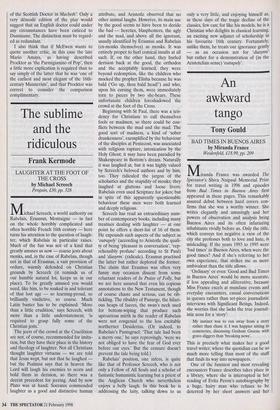An awkward tango
Tony Gould
BAD TIMES IN BUENOS AIRES by Miranda France Weidenfeld, £18.99, pp. 209 Miranda France was awarded The Spectator's Shiva Naipaul Memorial Prize for travel writing in 1996 and episodes from Bad Times in Buenos Aires first appeared in these pages. This remarkably assured debut between hard covers con- firms that she was a worthy winner. She writes elegantly and amusingly and her powers of observation and analysis bring Buenos Aires and its often infuriating inhabitants vividly before us. Only the title, which conveys too negative a view of the city she professes both to love and hate, is misleading. If the years 1993 to 1995 were `bad times' in Buenos Aires, when were the good times? And if she's referring to her own experience, that strikes me as more ambivalent than the title allows.
`Ordinary' or even 'Good and Bad Times in Buenos Aires' would be more accurate, if less appealing and alliterative, because Miss France excels at mundane events and everyday encounters, casual conversations in queues rather than set-piece journalistic interviews with Significant Beings. Indeed, she worries that she lacks the true journal- istic nose for a 'story':
My instinct was to run away from a story rather than chase it. I was happier sitting in cemeteries, discussing Graham Greene with grave-diggers than 'breaking news'.
This is precisely what makes her a good travel writer, where the quotidian can be so much more telling than most of the stuff that finds its way into newspapers.
One of the funniest and most revealing encounters France describes takes place in a library, where she is interrupted in her reading of Evita Peron's autobiography by a huge, hairy man who refuses to be deterred by her short answers and her attempts to appear engrossed in her reading. They go through the standard commonplaces about the weather in Eng- land and the expensiveness of London, and the author braces herself for the inevitable Falklands question. So, she is taken aback when instead of that the man says he hears that in London 'you can't even get oranges'. Provoked at last, she indignantly refutes this, adding that oranges are both cheaper and more readily available in Lon- don than in Buenos Aires: 'The man's eyes flashed triumph. I had revealed myself to be a pompous little imperialist after all.' The conversation degenerates into a slang- ing match about avocados, aubergines and courgettes, until she coldly asserts that she wishes to get on with her work:
`By all means.' The man raised his eyebrows and shrugged with Italian exaggeration, to show that I had taken a few innocent remarks in bad part. But I was too aggrieved to concentrate on the book after that.
The humiliation of 'this horticultural re- enactment of the Falklands War' is exacer- bated when the only witness to it, a young man browsing in the stacks, makes a clumsy pass at her as she tries to exit with dignity.
Miranda France does cover the recent sad history of Argentina, the excesses of Peronism and the Dirty War, as well as the Falklands/ Malvinas War, but her true talent lies elsewhere. Her social observa- tion, whether it is in charting the portetios' passion for therapy — Buenos Aires is 'the world capital of psychoanalysis' — or their obsession with their appearance (in a chap- ter called 'A Fear of Falling Buttocks'), is spot on. Her instinct is less sure, however, when she interviews a 'military expert' and finds it impossible to reconcile his emotion- ality and apparent likeability with a dawn- ing realisation that he was almost certainly a torturer during the Dirty War. Here she Protests a little too much, as if straining after an emotion she does not quite feel but knows she should, though she retrieves the situation with a subtle analysis of her own (over-) reaction.
At the beginning of the book we learn that Miss France has a male companion with whom she rents an apartment. But his presence remains spectral throughout, indi- cated only when 'I' occasionally slides into `we'. The poor chap never even acquires a name, and when she flies out of Buenos Aires she seems to be on her own.
But this is a quibble. The pretensions of the Argentines make them the subject of jokes all over South America, and France unearths a few prize monsters for our delectation. But she is a kindly satirist and there is generally some affection in her humour. And when she cares for someone, like Hugo the graveyard philosopher, she writes of them with real warmth. So despite the many frustrations of Argentinian life and the unreality of the city built on the edge of the endless pampa, one ends up sharing her sadness to be leaving it. That is the measure of her achievement.



























































 Previous page
Previous page